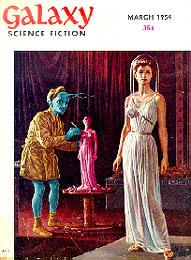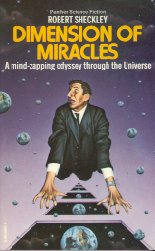BIOGRAPHY
Robert Sheckley (1928-2005)
 Robert Sheckley was born in 1928 and grew up in New Jersey. As a child he became
fascinated with what he now calls "escape literature".
He grew up in New York and New Jersey, and served in Korea with the U.S. Army.
In 1951 he received an undergraduate degree from New York University and sold
his first short story. Writers who inspired him include Ray Bradbury, Theodore
Sturgeon and Henry Kuttner. He sold his first story in 1951.
Robert Sheckley was born in 1928 and grew up in New Jersey. As a child he became
fascinated with what he now calls "escape literature".
He grew up in New York and New Jersey, and served in Korea with the U.S. Army.
In 1951 he received an undergraduate degree from New York University and sold
his first short story. Writers who inspired him include Ray Bradbury, Theodore
Sturgeon and Henry Kuttner. He sold his first story in 1951.
During the 1950s the science fiction market was booming, with dozens of magazines
competing with each other. The prolific young author took advantage and quickly
became a major force in the genre.
A huge number of his short stories appeared in magazines including Amazing,
Astounding, If, and Fantasy & Science Fiction. His most frequent contributions
were to Galaxy, sometimes using pseudonyms to disguise the fact he had written
more than one story in a particular issue.
 His first collection
of stories, “Untouched By Human Hands” (1954), was hailed as one of
the finest debut volumes in the field. Other exceptional collections
from this era include "Citizen in Space" (1955) and “Store of
Infinity” (1960). Several of his early stories were also broadcast on the
radio show X Minus One.
His first collection
of stories, “Untouched By Human Hands” (1954), was hailed as one of
the finest debut volumes in the field. Other exceptional collections
from this era include "Citizen in Space" (1955) and “Store of
Infinity” (1960). Several of his early stories were also broadcast on the
radio show X Minus One.
By the 1960's the science fiction magazines were in decline, replaced by the
new paperback market. Sheckley had already started a series of well received
novels, among them "Journey Beyond Tomorrow"
(1962) and "Dimension of Miracles" (1968). However, he remains best
known for his short stories. At a time when science fiction was just starting
to grapple with the social implications of technology - from atomic bombs to
missile-carrying rockets – he turned a satirist's eye on the genre and
its concerns.
"Sheckley at his best is Voltaire and Soda."
Brian Aldiss
 Like Ray Bradbury,
he was interested in the scientific apparatus of science fiction - space travel,
time travel, extrapolated futures - only so far as it served his purpose. While
Mr. Bradbury poetically mourns the failure to live up to our dreams of the future,
Mr. Sheckley mocked the self-delusions that lead to dreams in the first place.
Like Ray Bradbury,
he was interested in the scientific apparatus of science fiction - space travel,
time travel, extrapolated futures - only so far as it served his purpose. While
Mr. Bradbury poetically mourns the failure to live up to our dreams of the future,
Mr. Sheckley mocked the self-delusions that lead to dreams in the first place.
He reveled in the freedom the genre afforded him to dramatize the fears and
anxieties of everyday life. When he wrote about the war between the sexes, he
conjured a future in which disappointed lovers had the legal option of using
real bullets to express their anger. When he wrote about alienation as a state
of mind, he sealed the reader in an endless loop of disaffection that reduced
the outside world to a hallucination wrapped in an illusion.
"My best advice is to give oneself up to wonderful
madness." Harlan Ellison
Because he leavened his darkest visions with wit and absurdist plotting, he
is considered one of science fiction's seminal humorists, and a precursor to
Douglas Adams, whose "Hitchhiker's Guide to the Galaxy" (1979) seems
to take place in a Sheckleyan universe. But Mr. Sheckley's work is darker than
Mr. Adams's; the smiles he evokes leave a bitter taste on the lips. A better
comparison might be to Kafka, a fabulist who could never understood why his
friends didn't laugh when he read his stories to them.
He traveled widely, and for part of the 1970s he lived on the island of Ibiza,
where he was a member of a loose-knit community of artists. He was notably less
prolific during this decade (he later wrote about suffering writer's
block) though it did produce some of his most adventurous work (best sampled
in the 1971 collection “Can You Feel Anything When I Do This?”)
In the eighties Sheckley was fiction editor of Omni magazine for two years.
He also continued his "Victim" series of novels.
In the nineties he collaborated with Harry Harrison and Roger Zelazny.
By this time the demand for sci-fi short stories was low, but Sheckley still
appeared occasionally in themed anthologies. In this later work he sometimes
seems nostalgic for the pulp conventions he once subverted so brilliantly
Sheckley's work has been translated into many languages,
and he is especially popular in Italy, Russia and Eastern Europe.
Films based on his work include "The Tenth Victim"
(1965) and "Freejack" (1992).
Those unfamiliar with his work might like to start with "Dimension of Miracles"
(perhaps his finest novel, now available in the omnibus volume “Dimensions
of Sheckley”) and “The Robert Sheckley Omnibus” (an excellent
collection of short stories from the 1950s).
Obituary
This biography contains extracts taken from two excellent obituaries. One
from the New York Times by Gerald Jonas, the other from the Oregonian by Mike
Francis.
 Robert Sheckley was born in 1928 and grew up in New Jersey. As a child he became
fascinated with what he now calls "escape literature".
He grew up in New York and New Jersey, and served in Korea with the U.S. Army.
In 1951 he received an undergraduate degree from New York University and sold
his first short story. Writers who inspired him include Ray Bradbury, Theodore
Sturgeon and Henry Kuttner. He sold his first story in 1951.
Robert Sheckley was born in 1928 and grew up in New Jersey. As a child he became
fascinated with what he now calls "escape literature".
He grew up in New York and New Jersey, and served in Korea with the U.S. Army.
In 1951 he received an undergraduate degree from New York University and sold
his first short story. Writers who inspired him include Ray Bradbury, Theodore
Sturgeon and Henry Kuttner. He sold his first story in 1951.  His first collection
of stories, “Untouched By Human Hands” (1954), was hailed as one of
the finest debut volumes in the field. Other exceptional collections
from this era include "Citizen in Space" (1955) and “Store of
Infinity” (1960). Several of his early stories were also broadcast on the
radio show X Minus One.
His first collection
of stories, “Untouched By Human Hands” (1954), was hailed as one of
the finest debut volumes in the field. Other exceptional collections
from this era include "Citizen in Space" (1955) and “Store of
Infinity” (1960). Several of his early stories were also broadcast on the
radio show X Minus One.